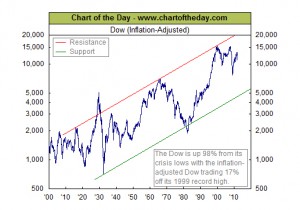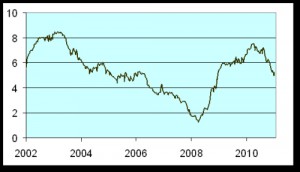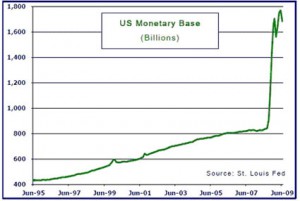Adjusted Stock Price Financial advisors will often tell us of the steady increases available only through the stock market and present us with beautiful charts showing the relentless march of the the stockmarket ever higher and to the right. But what about inflation? How does the stock market perform when inflation is taken into consideration? After we take the loss of purchasing power into account have all the gains disappeared? When adjusting stock prices for inflation we typically use the US Bureau of Labor Statistics Consumer Price Index CPI-U. Prices are then calculated in "real" dollars. That means that the price is adjusted so that we can see what it would have cost if prices … [Read more...]
The Doom of Wired Telecom
Advances in technology bring many changes to the business world, and certain industries that were once considered viable are now industries that should be avoided at all costs. One industry that is expected to shrink the most dramatically is the wired telecommunications carrier industry. This industry has been rapidly shrinking in response to the increasing widespread use of cell phones and online forms of communication. The need for wired communications has become so low that 25 percent of all households do not even own a land line phone. Some even predict that by 2025, land line phones will completely disappear. … [Read more...]
How Inflation Affects Personal Debt Consolidation
What is the effect of inflation? As a result of inflation, the value of tomorrow’s money decreases with regards to today’s money. In other words, you can purchase less with the same amount of money. This is commonly seen as prices having increased. This can make the situation appear more appealing for borrowers because they can buy today and pay back with less valuable dollars. But lenders and creditors don't appreciate receiving less valuable dollars. So, in order to offset the declining value lenders and creditors increase the interest rates they charge. Thus inflation in general results in increased financial problems all around. It not only results in rising commodity prices but … [Read more...]
How Global Financial Developments are Affecting the Price of Gold
Let’s face it. With the US economy facing the bitter consequences of extravagance and unscrupulous spending, it has become quite difficult for the US to manage both its public and private debts now. In this phase of post recession hangover and economic meltdown, the U.S. federal government has bumped up against its permitted borrowing limit. According to Alison Fraser, director of the Roe Institute for Economic Policy Studies, America’s debt just crossed $15 trillion, which means presently, the amount owed by the United States government to the world, is equivalent to the amount produced by the American economy per year. All these factors lead to higher prices and intensifying inflation … [Read more...]
Currency Strength Can Sap Returns
The following article by Lynn Carpenter shows an interesting correlation between currency appreciation (or depreciation) and stock market returns. London is a money town. It has been the center of the whole Western world’s currency transactions for three centuries. Until 1945, the British pound sterling was the world’s primary reserve currency. The pound is less popular than the dollar or euro now. But whatever currency is king, London is likely to bank it, trade it and exchange it. London bankers and brokers were old in the business when the New York Stock Exchange was born under a buttonwood tree on Wall Street. London bankers and fund managers were master investors when U.S. stock … [Read more...]
The Real Basket of Goods
I recently received the following from Ed Devol, "When I try to educate people about the impact of inflation, I find putting it in terms of time worked for something is a good way of explaining inflation". Thanks, Ed. I agree, when I am deciding whether to purchase something, I like to think of it in terms of how many hours I have to work to buy it. (It helps keep it "real"). In addition economists often link how many hours the average person has to work to eat. A poor country might require eight hours of work a day just to eat. While a rich country might require only 1 hour a day. So you might like the following article by Lynn Carpenter as she tracks prices and earnings over the last 60 … [Read more...]
Credential Inflation: Bachelor’s Degree Not Enough
In today's tumultuous economic climate, when we hear the term "inflation" we think money and a failing economy our minds immediately turn to expenses, debt, and money woes. Rarely, however, do our minds turn to college degrees and job prospects. On July 22, 2011 Laura Pappano from The New York Times published an article titled The Master's as the New Bachelor's. Introducing into the public mindset the concept of "credential inflation" and "degree inflation", this article has caused quite the hoopla in the academic world and many a panic attack among 20 somethings throughout the country. Pappano suggests that there is a certain amount of credential inflation occurring throughout the job … [Read more...]
Does The “FED” Really Just Print Money?
Printing Money, Quantitative Easing, Money Supply and Currency in Circulation--- how do they relate? Today we are looking at an excellent explanation on the FED's money printing process by James Hamilton, economist of the University of California, San Diego. Did the Federal Reserve really print a Trillion dollars in their Quantitative Easing program? Did that increase the money supply by a Trillion dollars? He presents some interesting charts on currency in circulation versus currency reserves. Tim McMahon, editor … [Read more...]
Inflation and Velocity of Money
How do you define inflation? In some ways it's a slippery thing, like trying to nail Jell-O to a tree. One common definition amounts to "a general and sustained rise in the price of goods and services." Another is "a persistent decline in the purchasing power of money." Others argue that inflation is directly tied to the money supply. That is to say, they believe a substantial rise in the money supply is the same thing as inflation. (This is one small step removed from Milton Friedman’s old assertion: "Inflation is always and everywhere a monetary phenomenon.") Why is the debate important? Because of the infamous chart you see below (courtesy of hedge fund QB Partners and the St. Louis … [Read more...]
The Case For Hyper-Deflation
by Carl BlackIn all of history, there has never been an episode of hyperinflation that involved a currency that exists primarily as digits stored electronically in accounting programs. Money is defined and decreed by government as being Federal Reserve Notes and Coins issued by the U.S. Mint, backed by the full faith and credit of the United States. The issue of what constitutes money within the United States is established by law and a matter of publicly accessible record and held as common knowledge. Credit is defined as the provision of resources (such as granting a loan) by one party to another party where that second party does not reimburse the first party immediately, thereby … [Read more...]




